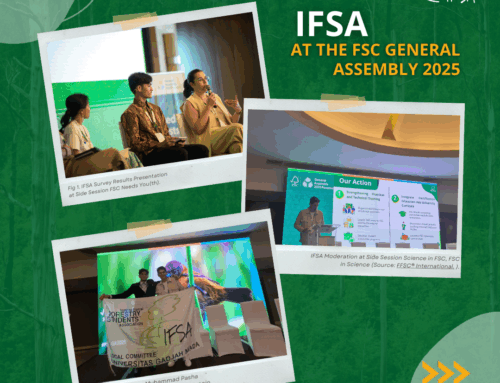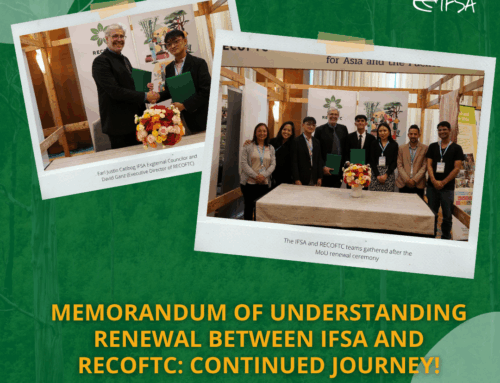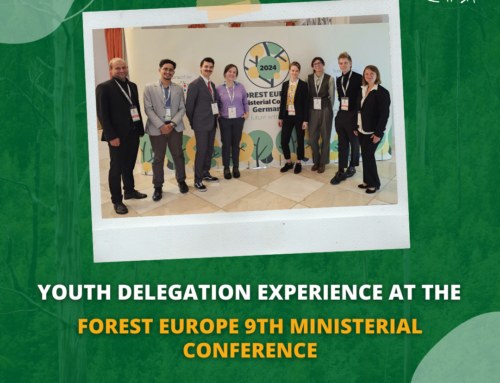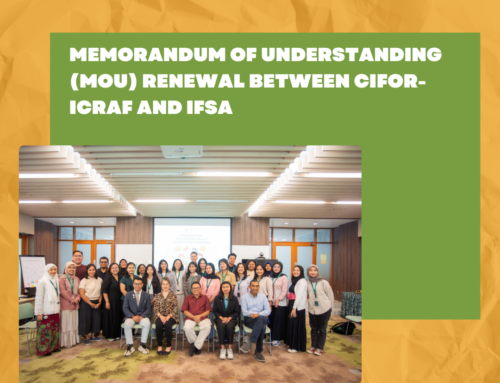IFSA Delegation at The Forests Dialogue
Bioenergy from Forest Scoping Dialogue
Location: Yale University, New Haven, CT, USA
Delegates: Karen Gómez García
Date: February 27, 2024
Organiser: The Forests Dialogue
Summary
Bioenergy from forests (BEF) is the energy produced by the combustion of wood, wood waste, or biofuels derived from wood. Wood-based energy, which has been used for millennia, has received renewed attention as a result of efforts to sustainably scale up its applications to meet energy resilience goals and replace greenhouse gas (GHG) intensive fossil fuel energy. The current focus on bioenergy from forests covers 6 broad dimensions:
- Accounting for the life-cycle climate effects of forest bioenergy
- System boundary
- Counterfactual (baseline)
- Sourcing forest biomass for bioenergy
- Effects of market changes
- Environmental justice and equity
In recent years, there have been debates in global climate forums and on policy discussions at the national level, as well as in industry and non-governmental organisation forums. While some believe that bioenergy from forests plays an important role in reducing GHG emissions and achieving net zero GHG emissions, others question the narrative that BEF is a “carbon neutral” energy source when considering the entire life cycle of emissions.
TFD uses techniques that range from intimate, small-group dialogues to large forums involving hundreds of participants. Direct engagement with issues underground at field sites is an essential component of many dialogue processes. This year’s event was held on February 27, 2024, in YALE, New Haven, Connecticut, USA.
IFSA, being an active partner in this dialogue, participated with an international delegate to listen and learn about initiatives in the environmental sector focused on BEF. To create connections and possible opportunities for IFSA, to continue to provide the perspective of the youngest voices, actors of change.
More than 20 people attended this dialogue to focus on the background paper “Bioenergy from Forests: Scooping Dialogue.” On this day, there were 10 hours for stakeholders to discuss the main points of the paper from their perspective and in the context in which each one develops. Attendees included representatives from legal, recreational, research, and even social organisations working to protect indigenous peoples’ natural areas.
The event agenda was extensive, beginning with a summary presentation of the main author, Weier Liu’s background paper. There was also a space for comments, followed by discussion tables, where we assigned each participant a table number and asked them to share their thoughts on the BEF. The first breakout discussion focused on the following questions:
“Q1. What about the Background Paper Areas of Concern resonated with you? What is missing?” and “Q2. What do you see as the main challenges related to bioenergy from forests?”.
At the first breakout session, the main ideas were:
Q1
The comments in this region were focused on taking into account the opportunity for infrastructure investment caused by severe wildfires, assisting in overcoming isolation and creating more resilient forestry systems with revenue streams/community integration, and generating the creation of NEPA crews that support ongoing project work and help finance and justify infrastructure. Improved technology is urgently required to deal with steep slopes and difficult landscapes, as well as to improve harvesting infrastructure.
Q2
The challenges presented by BEF are mainly the shrinking and ageing forestry labour workforce. The variability of climate results depends on regional context and LCA methodologies, impacts on local and Indigenous communities (air quality concerns, land use, community perceptions of harms), and impacts on biodiversity. Another issue was climate risks, which present uncertainties in the availability of feedstock, and competitiveness with emerging renewable energy technologies. Market uncertainty is based on U.S. energy policy, regulation, trade, and carbon markets, and finally, the lack of tools to analyse future scenarios and plan biomass development.
The final session was divided into three groups based on the regions of the United States to which we belonged: Northeast, Southeast, and West. Each group’s comments were discussed before the next one began, which focused on “Q3: What are the specific challenges in your region?” and “Q4. What do you see as the most important opportunities and needs for BEF’s social-ecological-climate sustainability?”
During the last breakout session, the main ideas were:
Q3
North East
The northeast’s problems include low forest diversity across the region and within the stands, low growth and stocking, a lack of a market for low-grade material, and a lack of public acceptance of industrial bioenergy, all of which are compounded by pests and pathogens and reduce forest health and resilience, resulting in poor quality material for the industry.
South East
On the other hand, the southeast presents challenges in maintaining forest land, resulting in a lack of access to diverse markets for low-value forest products, legacy markets are disappearing; there is a lack of access to new markets; as well as a lack of innovation and air pollution monitoring.
West
The country’s west is experiencing acute and severe weather effects (forest fires, droughts). One of the most serious issues is a lack of manpower, and the high cost of equipment makes it difficult for new producers, as does a lack of infrastructure and transportation. In this part of the country, the forestry service and permits are both slow, resulting in a lack of continuity in projects due to federal delays. As in previous regions, fires pose a risk to climate resilience, resulting in vulnerable ecosystems.
Q4
North East
The main areas of opportunity they find in this region are funding sustainable forest management, supporting rural economies and labour, building forest climate resilience, and providing an urban/rural connection and market access. Additionally, a low stocking rate has been found to make EAB markets more economically viable. The main theme, based on needs, is community management.
South East
In this region, the comments were generalised, and the areas of opportunity and need to be taken into account are access to diverse markets for low-value forest products, a model of industrial parks with capacity for diversified production, taking into account products such as biocarbon, saf, and marine fuel, as well as the circular bioeconomy, and effective stakeholder engagement: diversity, values, trust, listening, accountability, and flex.
West
The comments in this region were focused on taking into account the opportunity for infrastructure investment caused by severe wildfires, assisting in overcoming isolation, and creating more resilient forestry systems with revenue streams/community integration, resulting in the formation of NEPA crews that support ongoing project work and help finance and justify infrastructure. Improved technology is urgently required to cope with steep slopes and difficult landscapes, as well as to improve infrastructure for product production.
Finally, several participants provided comments on the conclusions drawn from their perspectives on BEF and its future application.
Experience
Being a part of the BEF dialogue organised by TFD was a once-in-a-lifetime opportunity for me to represent IFSA as a delegate in an international event, as well as to listen to stakeholders from various sectors in the United States discuss the BEF.
The communication with Rizka Afif (Head of The Forests Dialogue Sub-Commission) and Steven Ring (Programme Associate, The Forests Dialogue) was excellent from the start; they made me feel like I was part of a united team, and the situation would not have been handled as efficiently without them and their prompt responses. Furthermore, upon arrival at the dialogue, Gary Dunning, the Executive Director of The Forests Dialogue, expressed his gratitude to me for representing IFSA at this important event for them and their partners. Getting to know them through their work as change agents was rewarding because I learned how a dialogue table with various actors in the forestry and environmental sectors works, which will be useful in my future projects.
Another interesting part of the event was the logistics of the dialogue. The breakout discussions worked effectively to get as much information as possible that was required. In these, I made some comments regarding the BEF in Mexico and shared some examples of it, and although the dialogue was focused on the US, my participation was always taken into account, something extremely important in this type of dialogue as they demonstrated the interest they have in listening to the younger voices.
At the end of the event, he addressed a few words of thanks to all the participants and organisers for the invitation. I added the quote from my words:
“To the TFD for all that I learned today, thank you for teaching me more about the generation of bioenergy from your forests in your country. I have left many things to analyse today. As a representative of the younger voices in this dialogue, I can say that I see a good future for being able to collaborate with the different business sectors and that this will support the communities to benefit from this movement that, although it is not new, we are working on.
I will be attentive to all the conclusions that are generated today, and I will take this to the young people who are part of my association so that they know that there are opportunities within our career and that the opportunity for sustainable development is possible. Today, the base document gave us much to talk about and to know. My country is initiating the progress of this type of energy, which I hope will bring good things both socially, politically, and economically. I hope to see you next time to contribute more of my knowledge to my country. I hope that someday we see each other to discuss and share our knowledge in another forum like this, but in a global way.”
I also had the opportunity to get to know more about the organisers in their context as students, where I can highlight that their participation and organisation in this event are of utmost importance because, despite having papers due, classes, exams, and other responsibilities, the event was a success. I also had the opportunity to meet members of IFSA Yale and tour the campus with them.
Communication with Partners
The communication within the dialogue was excellent, I had the opportunity to be able to talk with Gary Dunning about our association and how we as members participate actively to make IFSA a proactive, participative, responsible and respectful place in all our areas, within the dialogue I could connect with people like Zander Evans: Executive Director in Forest Stewards Guild, Joseph L. Taggar: President at LandVest, Kyla Cheynet: Director of Sustainability in Drax, Bakul Wadgaonkar: Director Sustainability in SAPPI, Edie Juno: Forestry Specialist in National Wildlife Federation, Phil Rigdon: DNR Deputy Director in Yakama Nation, who were open to learn more about IFSA as a student association of empowered youth in the environmental and forestry sector, and learn more about the diversity in other countries.
End Note
My experience with this delegation was amazing. Often we face the fear of rejection, but I firmly believe that those members who continue working hard and striving to give their best for their local committee are on the right path. Perseverance, dedication, and commitment are invaluable qualities that are cultivated by being part of an LC, and they are rewards that cannot be found anywhere else. Despite the tough times, if we love what we do and do it with pleasure, the benefits will come in time.
I am deeply grateful to IFSA for choosing me to represent them at such an enriching event. This experience has changed my life: thanks to IFSA, I have been able to undertake projects, explore new lines of research, visit places I never imagined, and forge friendships that I now consider family.
Therefore, my advice to those who still hesitate to apply for a delegation, a position in IFSA, or to be part of a local committee is not to be afraid to take that step. Believe me, you will be making one of the best decisions of your life. Your knowledge and dedication will lead you to fulfil your dreams.
Thank you, IFSA, for trusting in me and showing me that there is a world of possibilities beyond a classroom.
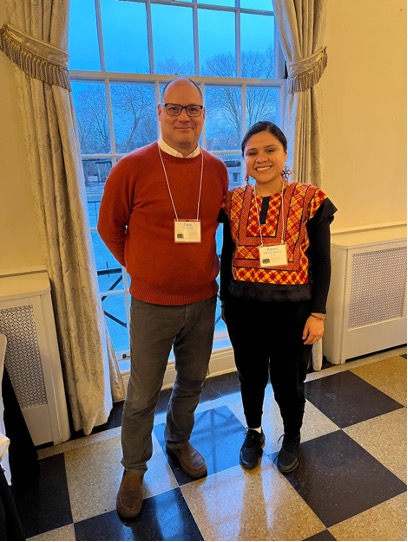
Picture 1. Karen Gómez, IFSA delegate to the BEF-TFD, with Gary Dunning, Executive Director of TFD (Source: Karen Gomez Garcia)
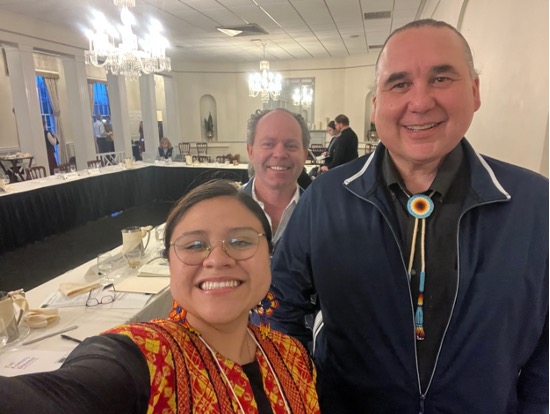
Picture 2. Karen Gómez, IFSA delegate to the BEF-TFD, with dialogue members Joseph L. Taggar (behind) and Philip Rigdon (front right) (Source: Karen Gomez Garcia)

Picture 3. IFSA BEF-TFD delegate Karen Gomez with organisers Steven Ring (far left) and Leah Snavely (middle) from TFD Programme Associates (Source: Karen Gomez Garcia)
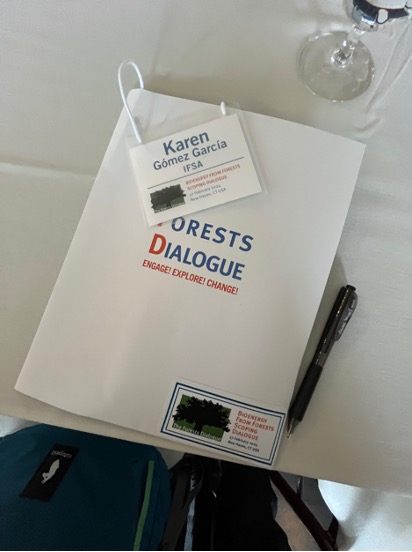
Picture 4. BEF-TFD Welcome Package (Source: Karen Gomez Garcia)
Authors: 1. Karen Gómez García, IFSA CHAUPEA 2. Rizka Afif, IFSA LC UGM

